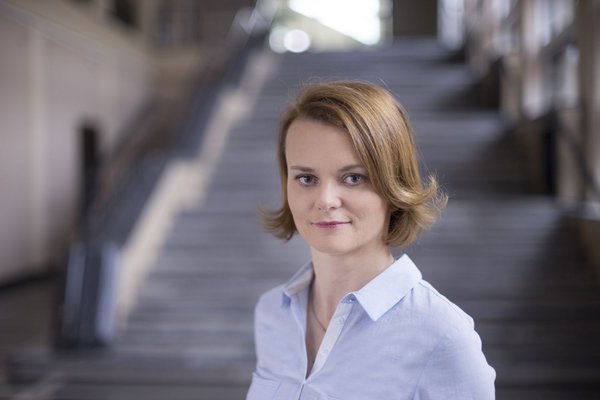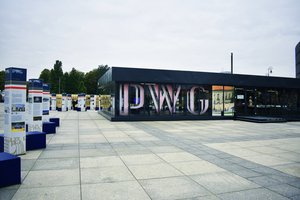We have huge potential
“We have huge human potential and this is the most important factor when it comes to the development of Polish innovation. This is an incredible situation, where all organs of power have put a great emphasis on the start-up community and young technological firms that have something interesting to offer,” says Jadwiga Emilewicz, Undersecretary of State in the Ministry of Economic Development, in an interview with Poland.pl.
Poland.pl: This year, Poland came 39th out of 128 countries in the “Global Innovation Index 2016” ranking published by Cornell University in co-operation with the World Intellectual Property Organisation. We jumped seven positions compared to last year. Can 39th position be considered as a success? How does Poland compare with other European countries in terms of innovation?
Minister Jadwiga Emilewicz: This is one of the most demanding rankings, where climbing even one position is a success. Jumping seven positions is a big optimism boost and I think it sends out a message that the political objectives that we have chosen are good and need to be continued. I hope that we will be able to climb even higher up the ranking and that it will reflect the real condition of innovation in Poland.
What is the government doing to improve our capacity for innovation and to stimulate innovation? What are Poland’s ambitions in this area?
We have included innovation as one of the main elements of the Responsible Development Plan. Its five pillars include reindustrialisation, understood as modern industry, which in today’s literature we refer to as Industry 4.0 – the forth industrial revolution, and this can only take place when the economy becomes more modern, more innovative, in search of new products, new processes as well as new markets.
With this aim in mind, we are working to make legislative changes – a new law supporting innovation has just made its way to the Sejm. Its objective is to encourage businessmen – and Poles in general – who have savings locked in their accounts to invest in research and development, which will be aimed at implementing new technologies and creating new products. Someone who decides to invest in such an enterprise will be able to count on a tax rebate of 50 per cent. This is the first clear indication of the intention of the legislator and the government of the importance we give to innovative entrepreneurs.
The second very significant element is the Polish Development Fund’s very strong support for venture capital funds. There are still not that many of these funds in Poland. Innovative, modern economies have a lot more of them and it is exactly these companies that help generate the most cutting edge technologies.
In order for such funds to develop in Poland, a capital investment platform is being created in the Polish Development Fund, which will be the biggest platform of its kind in Central Europe . That will not only allow the local market to develop, it will also attract funds from abroad. Here one can expect support worth up to 50 per cent and during each stage of development, in the earliest, seed phase as well as during accelerated, dynamic growth.
During this first phase, investors know that investments are not very desirable – from a few to around a dozen million zloty. In the remaining phases, investments are longer term and can reach up to 60-100 million zloty. They will also be able to count on such support from the Polish Development Fund. It is a very promising instrument.
I hope that Poland will become a place which attracts those with ideas, that is start-ups, as well as those with funds, angel investors, who will want to invest their money here and will find support from public funds.
What should Poland focus on in order to become an innovation leader?
Within the Responsible Development Plan we adopted a very selective approach with regards to sectors. It is different to previous plans in that public assistance up to now was quite widely spread, we weren’t selective, which is illustrated by the 20 specialty areas. Twenty is really a lot when we consider the potential of capital in Poland – it is seemingly impossible to end up with an interesting added value if you have equal investments in 20 different areas. That is why we opted for a more selective approach.
First, we are currently reviewing smart specializations nationwide. This is being done in co-operation with the leaders of each 20 specialisation areas, as well as with businessmen, while taking note of the applicants to the first contests announced this year, for example the National Centre for Research and Development’s “Fast Track” competition.
We are taking a close look at the specialisations with a high success rate. We are reviewing what is at hand with an eye to narrow the areas of specialization. We need to limit the catalogue by at least one half, that is to 10 areas.
We are looking at areas where there is an intersect between basic criteria, such as the technological intensity, environmental friendliness, low energy consumption, high design potential and intelligent transport solutions. We use these criteria as our compass. And this is one side of the selection process.
On the other hand, the second side – that is the selection of flagship projects – is a result of a simple analysis of the market, what we have on the table and deciding what we are actually advanced in and where we have the competitive advantage. Hence the selection of products, and deciding and developing the first flagship project in the form of electricity-driven public transport. We have national producers of ecologically friendly cars. Our aim and ambition is for vehicle components, their most valuable parts, to become the result of Polish technological thinking, because we know that we have such potential. We would be blind not to choose this sector as one of our starting points, taking into consideration that a Polish manufacturer is receiving the prestigious international Bus of the Year 2017 award.
Another sector, that of furniture production, is one of our flagship projects with regards to export. However, if we convert the importance given to these exports to its actual value then it is still limited. We want to apply certain instruments here in order to increase the value of these exports.
Another element is the “Luxtorpeda” project (rail transport), which we added to the Responsible Development Plan. Here too we have successful producers, in the Polish as well as European markets. This is a product-based approach to sectors which are strong today, and which we would like to make even stronger in the future.
Poland’s space sector is going from strength to strength. Poland will host its first ever European Space Agency infrastructure elements – a repository of data collected by satellites observing the Earth. Polish space sector companies are preparing devices for spectacular missions to the Moon and to Mars, they are installing instruments for the International Space Station. Polish scientists are working on the first Polish satellite. What are the main priorities of the Polish Space Strategy disclosed recently in Jasionka near Rzeszów?
In September we announced a long-term space policy strategy, which looks ahead to 2030. It is difficult to ignore the fact that since the moment when Poland joined the European Space Agency in November 2012, the number of entities active in this area have increased in an incredibly dynamic fashion.
Back then, there were less than 60 entities interested in applying to international programmes within the framework of the ESA and the space sector within Horizon 2020. Today there are over 300. We can see how dynamically this market is developing.
It is also worth pointing out that we are not starting from scratch as Poland has been active in the space sector since 1989. Given new working conditions, it turned out that there are a lot of engineers and Poland is counting on them. They are interested in being active in this area. Many Polish companies have participated successfully in international projects.
It is also worth noting that within Horizon 2020 the space sector is in second place when it comes to the success rate of Polish applications. We see the potential, hence our strategy and ambitious goals. We want Poland to become a hub for space exploration and data use. We want the service sector to develop further, in particular in the first stage derived from space imagery of the Earth and through building a satellite navigation system. We want the administration to be the first client of these services, something that we mentioned in our space policy strategy.
Today it is almost impossible to imagine monitoring air or water purity or the security situation in danger zones without space technology. We have enormous potential and we want to develop it further. We dream about having a Polish satellite but as Deputy Prime Minister Morawiecki said, our feet are firmly on the ground. It is a diverse market. The market for big satellites above 500kg is very structured – the world’s ten biggest players make up 78 per cent of the market. As a result, entering this niche is very difficult. But if we think about micro, small and nano satellites, then this market is significantly more open. In this case the top ten players make up 48 per cent of the market, which makes our presence more realistic.
We have already tested the waters. We know that students at Warsaw’s University of Technology have already sent a first satellite into space and a second mission is planned for next year. The government is playing an active role in this project. Of course, it is a student project. It shows that we have the potential and the people who will be able to develop in this area.
Could Poland set up its own Silicon Valley? Which Polish IT start-ups would form the basis of such an endeavor?
I don’t like the term Polish Silicon Valley. Certain things have their time and place and Silicon Valley is where it is. We can consider whether such a phenomenon could be repeated. I think that rather not, because we organize our education processes differently. Our university campuses are in town centres, students live in a diffused area, so the garage culture would not be emulated here. If we succeed, then it would be a result of a Polish model of the Valley.
As Polish high-school students are winning international IT contests, it means that we have the human capital, and this is the most important factor with regards to turning points in the area of Industry 4.0. This human capital is not fading, because students are, for example, also winning competitions to design Mars rovers and are among the laureates of contests organized by Elon Musk linked to the Hyperloop. We have to make sure that high-school students don’t dream about studying abroad, but rather study and develop in Poland, for example by means of a relevant scholarship system.
We want innovation hubs to appear around successful universities. The university should be the seedbed. In particular, it is worth focusing on those universities that have created technological parks around them with spin-off companies set up by students, young researchers who have commercialized technology. This focus is placed on them, for instance in the reforms proposed by the Minister of Science and Higher Education which call for special grants to be given to academic institutions with technological parks, which create conditions for small firms to be created.
Today, they have no incentive to create their own Silicon Valley. There are no financial incentives. We will try to use EU funds to create a number of such competence-based hubs which will shine beyond Poland’s borders. We must remember that while praising Polish computer scientists and engineers today, we are also aware that we don’t have enough of them to saturate the Polish market.
I hope that these innovation hubs will allow us to also attract young, talented engineers from Visegrad Group countries and, more widely, from Central Europe as well from those countries that are not yet in the European Union.
How does the government promote Polish start-ups abroad?
It is an incredible situation when all organs of power have put a great emphasis on the start-up community and young technological firms, that have something interesting to offer. This is why the Start in Poland programme was created, co-ordinated by the Polish Development Fund.
This is why the recent event in the Presidential Palace took place – “Start-ups in the Palace” – where selected start-ups were able to present to the president, the CEOs of large Polish companies, venture capital representatives as well as angel investors. They all received invitations to the president’s mission to the United States. The first three will travel to Lisbon for the Web Summit. Start-ups are invited to economic missions.
The Prime Minister also announced that she would take Polish start-ups into account during her missions abroad. I hope that all of these impulses will not impede the work of start-ups, because after all it is not enough to travel and give presentations – you need to have something to present in the first place.
We are currently working with the Ministry of Foreign Affairs and the Ministry of Interior Affairs and Administration in creating awards for start-ups, something we have initially called the “Polska Prize”. Next year we want to invite 50 representatives from non-EU countries, who are interested in setting up companies in Poland and who have interesting ideas relating to technology. Such initiatives already exist in Europe and I think that it is high time for them to take root in Poland as well. We will not neglect our start-ups and we will send them to important meetings around the world, wherever start-ups are presenting.
Interviewed by Magdalena Majewska, Bartosz Marcinkowski

Jadwiga Emilewicz is an Undersecretary of State in the Ministry of Economic Development. She supervises the implementation of the Intelligent Development 2014-2020 Program. She is responsible for issues related to the development and coordination of the implementation of strategic and program documents in economy and for activities conducive to the growth of competitiveness and innovativeness of Polish economy.
27.09.2016







